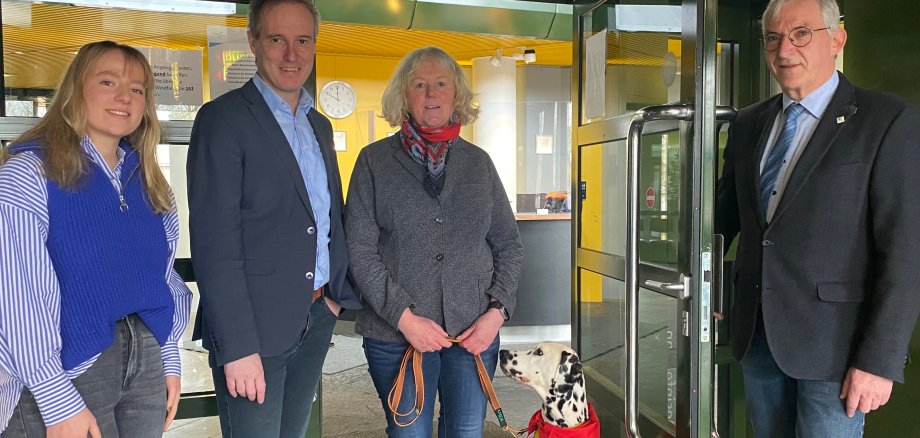County is assistance dog friendly municipality
Assistance dogs compensate for disabilities and make their owners more independent and secure. However, it is often difficult for them to enter public buildings, even though the companionship of the animals is indispensable for some people. This is not the case in the district of Waldeck-Frankenberg, where an active welcoming culture is lived. Therefore, the district administration has joined the nationwide campaign "Assistance Dogs Welcome" of the association Pfotenpiloten.
Promoting diversity and tolerance at all levels
People who are accompanied by an assistance dog - so-called assistance dog teams - are welcome in all administrative offices of the district. District Administrator Jürgen van der Horst, First District Commissioner Karl-Friedrich Frese and all employees of the district administration are committed to this. "As an administration, we are always working to promote diversity, tolerance and inclusion at all levels," says District Administrator Jürgen van der Horst. "In order to promote equal participation of all in social life, we have consciously decided to participate in the campaign - to bring the issue more into focus, to raise awareness and to further increase the acceptance of assistance dogs in society."
Employees sensitised to assistance dogs
Therefore, not only are notices placed on the entrance doors of the administrative offices indicating that assistance dogs are allowed and welcome in the buildings. The employees of the district administration have also been sensitised to the issue once again. People who are dependent on an assistance dog can bring their animals to appointments, consultations or visits to the authorities. This can already be planned for when making an appointment - by telephone or online, where an extra field can be ticked in the registration process if the accompaniment of a dog is desired.
"Our staff can then also optimally prepare for the appointment and, if necessary, coordinate further if allergies or fears play a role," says First District Commissioner Karl-Friedrich Frese. "We have prepared this accordingly in advance, communicated it within the building and also set up the corresponding organisational structures for it." He says it is important to send a clear signal. "Assistance dogs are a component of inclusion in practice and can compensate for a variety of impairments.
Besides guide dogs, there are many types of assistance dogs. In a human-dog team, they take on lifelong supportive functions for people with physical, neurological or sensory impairments and are specially trained to act independently. In addition to guide dogs for the blind, assistance dogs also provide support in cases of limited mobility, seizure disorders such as epilepsy or narcolepsy, hearing impairment, autism and PTSD, allergies and diabetes, and delayed development. New fields of action are still being added regularly, in which assistance dogs enable their humans to make countless health and social improvements through their faithful assistance.
Four-legged staff
For example, the four-legged companions have already been used on a voluntary basis for several years as needed by the district's specialist health service: In the area of self-help or also the social psychiatric service, they provide a calm and relaxed atmosphere as door openers and bridge builders - even with difficult or stressful topics of conversation - and radiate calmness and composure. The animals can exert a positive influence in many situations.
"Therefore, we as a district also want to be a role model by participating in the project," say the district administrator and the first district councillor. "We would therefore very much welcome it if other areas - not only municipalities, but for example other public institutions or even the retail trade - would also join the project." In this way, diversity and tolerance at all levels could be spread even more widely in the district. In achieving this goal, the district works together with many partners such as its own specialist office for migration and integration, its women's office or the EUTB - contact point for supplementary independent participation counselling, which has contributed to the assistance dog project being implemented in Waldeck-Frankenberg. Further information is also available online at www.pfotenpiloten.org.
Keywords:
Assistance Dogs Welcome Specialist Service Women's Office Inclusion Equality
